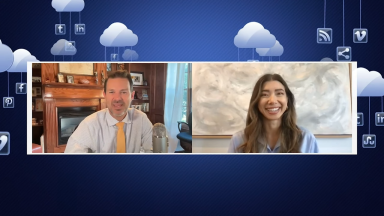Overview
Dr. Julie Fratantoni recently spoke about the impact of social media on the developing brain on WFAA Daybreak with newscaster Marc Istook. According to a Pew Research study, 36% of teens admit they spend too much time on social apps, with 54% confessing that giving up this activity would prove difficult. Research scientists like Dr. Fratantoni point out that the brain's reward network compels us to keep checking social media, seeking out the dopamine hit that comes with another like, view or friend request. But this nonstop flow of dopamine takes a toll on brain health – decreasing attention, focus and quality of sleep and in-person interactions, as well as time spent recharging the brain. However, the incredible neuroplasticity of the pediatric brain also allows children a heightened ability to "rewire" their cognitive processes by intentionally practicing brain-healthy habits.“”

